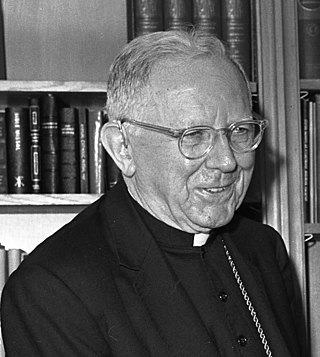See also
- Mary McIntire Pacheco (1842–1913), American novelist and playwright
Mary McIntyre may refer to:

James Francis Aloysius McIntyre was an American prelate of the Catholic Church. He served as Archbishop of Los Angeles from 1948 to 1970, and was created a cardinal in 1953. He was a highly successful builder of new parishes, churches, and schools. He was notable in Church politics, and his reputation remains highly controversial.
McIntyre, McEntire, MacIntyre, McAteer, and McIntire are Scottish and Irish surnames derived from the Gaelic Mac an tSaoir literally meaning "son of the Craftsman or Mason", but more commonly cited as "son of the Carpenter." The corresponding English name is Wright. It is common in Ulster and the highlands of Scotland, found in Ireland mostly in counties Donegal, Londonderry, Tyrone and Sligo.

Peter McIntyre was a New Zealand painter and author who rose to prominence as a result of artwork produced in his capacity as an official war artist during the Second World War.
Peter McIntyre or MacIntyre may refer to:
The following lists events that happened during 1915 in New Zealand.
The Missing Links were an Australian garage rock, R&B, and protopunk group from Sydney who were active from 1964 to 1966. The group was known for wearing their hair long and smashing their equipment on-stage. Throughout the course of 1965, the band would go through a complete and total lineup change resulting in two completely different versions of the band: the first consisted of Peter Anson on guitar, Dave Boyne on guitar, Bob Brady on vocals, Danny Cox on drums and Ronnie Peel on bass and released their debut single, "We 2 Should Live" in March 1965.
Macpac is a brand specialising in outdoor recreational equipment. It is best known for camping and travel equipment including backpacks, sleeping bags and technical clothing. Macpac was originally a New Zealand company but is now owned by the Australian company Super Retail Group. Macpac was founded by Bruce McIntyre in 1973.
John McIntyre may refer to:
Duncan MacIntyre or Duncan McIntyre may refer to:

Michael Hazen James McIntyre is an English comedian, writer, and television presenter. In 2012, he was the highest-grossing stand-up comedian in the world. As of 2023, he presents his own Saturday night series, Michael McIntyre's Big Show, and the game show, The Wheel, on BBC One. He also hosted the American version of The Wheel on NBC.
Robert MacFarlane or McFarlane may refer to:
William McIntyre may refer to:
The Town of Christchurch by-election of 1856 was a by-election held in the Town of Christchurch electorate during the 2nd New Zealand Parliament, on 18 November 1856.
Whanganui Girls' College is located in Jones Street Whanganui near the Dublin Street Bridge. The school is one of the oldest single sex educational facilities in New Zealand, founded in 1891.
Hugh McIntyre may refer to:

Taymor Travon McIntyre, better known professionally as Tay-K is an American rapper and convicted murderer. He is best known for his 2017 song "The Race", which peaked at number 44 on the US Billboard Hot 100 and received platinum certification by the Recording Industry Association of America (RIAA). Its lyrics detailed criminal activity carried out by McIntyre, and became popular following a nationwide manhunt for his eventual arrest in Elizabeth, New Jersey.
Mary McIntyre is a New Zealand artist. Her works are included in major art collections in New Zealand and Australia.
The 1949 King's Birthday Honours in New Zealand, celebrating the official birthday of King George VI, were appointments made by the King on the advice of the New Zealand government to various orders and honours to reward and highlight good works by New Zealanders. They were announced on 9 June 1949.
The 1992 Queen's Birthday Honours in New Zealand, celebrating the official birthday of Elizabeth II, were appointments made by the Queen in her right as Queen of New Zealand, on the advice of the New Zealand government, to various orders and honours to reward and highlight good works by New Zealanders. They were announced on 13 June 1992.